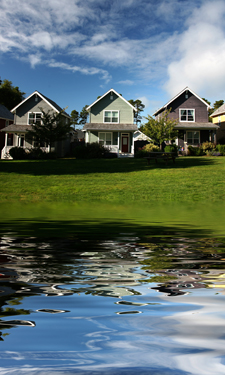 $1,214: Increased sale price of a home if within 1,500 feet of an urban park.
$1,214: Increased sale price of a home if within 1,500 feet of an urban park.
$5,657: Increased sale price of a home if within 1,500 feet of a specialty park.
$8,849: Increased sale price of a home if within 1,500 feet of a golf course.
$10,648: Increased sale price of a home if within 1,500 feet of a natural forest area.
29¢: Cost required for services for open-space lands per dollar of revenue generated.
32: Average percentage of savings per unit to supply infrastructure services to a compact, walkable community versus a conventional subdivision.
30: Percentage of runoff reduction achieved in a compact community versus a conventional subdivision.
83: Percentage of water-use reduction achieved in a compact community versus a conventional subdivision.
0.6: Percentage of increase in house price correlating with a 10 percent increase in lot size.
20 to 30: Percentage of increased sales for developed lots with trees versus similarly sized lots without trees.
$71.6 billion: Amount the state of Rhode Island is projected to save from 2001 to 2021 by building new housing units within existing urban areas instead of undeveloped areas.
Source: The Economic Benefits of Open Space, Recreation Facilities, and Walkable Community Design
Economic Benefits of Open Spaces
April 1, 2013, Department, by Danielle Taylor

